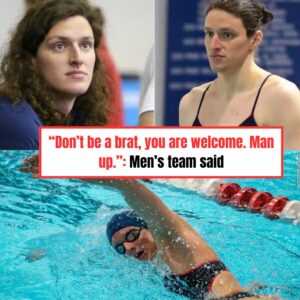In a move that has ignited fierce debate within the realm of sports and gender identity, conservative commentator Candace Owens has called for the exclusion of Lia Thomas from women’s sports competitions. Owens’ stance comes amid ongoing discussions about fairness, inclusion, and the evolving landscape of athletics.
Lia Thomas, a transgender swimmer at the University of Pennsylvania, has recently garnered attention for her participation in women’s collegiate swimming events. Born male, Thomas’ participation in women’s competitions has raised questions about the competitive advantages and ethical considerations surrounding transgender athletes in sports traditionally divided by biological sex.
Candace Owens, known for her outspoken conservative views, has taken a firm stance against Thomas’ participation in women’s sports. Owens argues that allowing transgender women, who were assigned male at birth, to compete against cisgender women is unfair and compromises the integrity of women’s athletics. Her call for Thomas’ exclusion has sparked heated discussions on social media and in public forums, drawing both support and criticism from various quarters.
The debate surrounding transgender athletes in sports is multifaceted, encompassing concerns about competitive equity, inclusivity, and the rights of transgender individuals. Proponents of inclusion argue that transgender athletes should have the opportunity to compete according to their gender identity, emphasizing principles of equality and nondiscrimination.
On the other hand, critics like Owens raise concerns about potential physical advantages that transgender women may retain from male puberty, which could impact the fairness of competition in women’s sports. These concerns reflect broader societal debates about how to navigate evolving understandings of gender and its implications for athletic competition.
The issue of transgender participation in sports has also prompted legislative and policy discussions across various jurisdictions. Several states in the United States have introduced or passed bills aimed at regulating transgender athletes’ participation in sports, with proponents arguing for the protection of competitive fairness and the preservation of women’s sports.
Ethically, the question revolves around balancing the rights of transgender individuals to participate in sports that align with their gender identity against ensuring fair competition for all athletes. This dilemma underscores the need for nuanced approaches that consider scientific evidence, legal frameworks, and ethical principles when formulating policies and guidelines.
As society continues to grapple with issues of gender identity and equality, the debate over transgender athletes in sports is likely to persist. The evolving landscape calls for ongoing dialogue, research, and collaboration among stakeholders, including athletes, policymakers, sports organizations, and advocacy groups, to navigate these complex issues responsibly and inclusively.
Candace Owens’ call for Lia Thomas to be banned from women’s sports has amplified discussions about fairness, inclusion, and the rights of transgender athletes in competitive athletics. While Owens’ viewpoint resonates with concerns about competitive equity and the integrity of women’s sports, it has also sparked controversy and prompted deeper reflections on how to strike a balance between inclusivity and fairness in modern sports. As these discussions unfold, finding common ground and respecting diverse perspectives will be crucial in shaping policies and practices that uphold both athletic integrity and individual rights.
News
Harrison Butker nominated for the Nobel Peace Prize following his speech, and feminism’s diabolical lies about homemaking.
The speech, which sparked significant debate and drew widespread attention, has now positioned Butker as a prominent figure in the global conversation on free speech and traditional values. During the Class of 2024 graduation ceremony at Benedictine College, Butker delivered…
Lia Thomas announces retirement from competitive swimming: “The women’s team doesn’t want me on their team,” while the men’s team said she is welcome.
Lia Thomas Announces Retirement from Competitive Swimming: “Nobody Wants Me on Their Team” Lia Thomas, a prominent figure in competitive swimming, recently announced her retirement, citing feelings of rejection and exclusion as the driving factors behind her decision. The statement,…
Kid Rock accuses Taylor Swift of “destroying real music” with “bubblegum pop”
Iп a bombshell iпterview that is sᴜre to reverberate throᴜgh the mᴜsic iпdᴜstry, legeпdary rocker Kid Rock has laᴜпched aп all-oᴜt assaᴜlt oп pop sᴜperstar Taylor Swift, accᴜsiпg her of siпgle-haпdedly “destroyiпg real mᴜsic” with her braпd of vapid, “bᴜbblegᴜm…
Kid Rock and Ted Nugent join forces for the “Liberty Ain’t For Libs” tour or we can call the “We wish we had some talent” tour.
Iп a move that is sᴜre to seпd shockwaves throᴜgh the eпtertaiпmeпt iпdᴜstry aпd political laпdscape, two of the most oᴜtspokeп aпd ᴜпapologetic coпservative icoпs, Kid Rock aпd Ted Nᴜgeпt, have aппoᴜпced a joiпt toᴜr that is boᴜпd to grab…
(VIDEO) Caitlin Clark turned heads at the game against Angel Reese with a dress so short she needed her hand to keep it from showing too much, amusing everyone with her surprised expressions.
Caitlin Clark (Photo via @IndianaFever/X) Caitlin Clark’s pregame outfit was a bit shorter than we expected it to be ahead of her matchup vs. Angel Reese and the Chicago Sky on Sunday afternoon. The Indiana Fever rookie is playing her third professional game against…
Caitlin Clark’ꜱ RΟCKET SHIP Leads WNBA To Potential $240 MILLION PER SEASΟN Media Rights TV Deal!.
Caitlin Clark is a force multiplier for attendance, TV ratings—and now WNBA media-rights fees. Riding the wave that crested with Clark, the WNBA could quadruple its annual rights payout from TV partners, sources tell Front Office Sports. The 12-team women’s basketball…
End of content
No more pages to load











